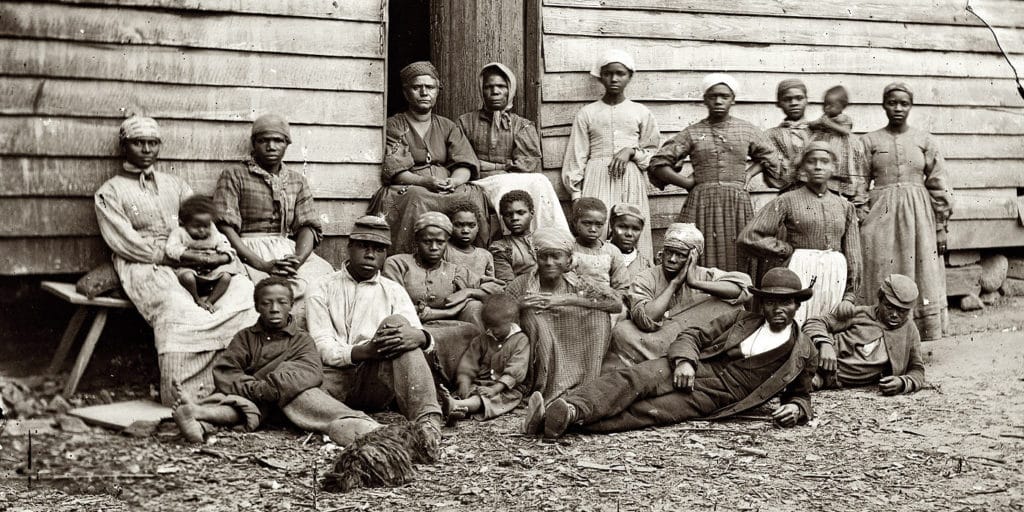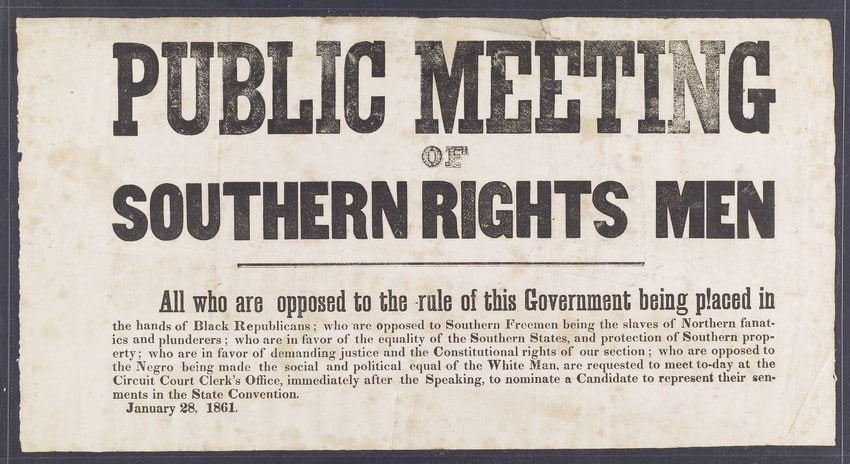The causes of the Civil War were complex and have been controversial since the war began. The issue has been further complicated by historical revisionists, who have tried to offer a variety of reasons for the war. Slavery was the central source of escalating political tension in the 1850s.
The Republican Party was determined to prevent any spread of slavery, and many Southern leaders had threatened secession if the Republican candidate, Lincoln, won the 1860 election.
Jump to:
After Abraham Lincoln had won without carrying a single Southern state, many Southern whites felt that disunion had become their only option because they felt as if they were losing representation, which hampered their ability to promote pro-slavery acts and policies.
Read Article: Famous Civil War Generals
Slavery

The emancipation of slaves has been an issue in America since the American Revolution. In Thomas Jefferson's first draft of the Declaration of Independence, he had a clause in it that emancipated the slaves.
Throughout the American Revolution, the armed slave was a hot button in the South, and even under enormous political pressure, they would not allow it.
After the war ended and America was granted its freedom, slavery continued to be an issue that would be debated in taverns but largely ignored. It threatened to tear the nation in half in its infancy, so other issues were dealt with first. Many believed slavery would eventually die on its own.
Eli Whitney's invention of the Cotton Gin made slavery profitable again. The issue was again brought to the forefront of American debate. The divide was so severe that a compromise was reached to allow the admission of a free state and a slave state to maintain the balance.
It became a firestorm, and the compromise would keep things calm on the surface, but underneath were the makings of a volcano. The Dred Scott decision ignited the North, as did John Brown in bleeding Kansas.
Every President who came into office had to figure out how to handle the situation, and each time they would leave office, the situation was worse. After the election of Abraham Lincoln, it became clear that war was inevitable.
States' rights

Everyone agreed that states had certain rights, but did those rights carry over when a citizen left that state? The Southern position was that citizens of every state had the right to take their property anywhere in the U.S. and not have it taken away. Specifically, they could bring their slaves anywhere, and they would remain slaves.
Northerners rejected this "right" because it would violate the right of a free state to outlaw slavery within its borders.
Republicans committed to ending the expansion of slavery were among those opposed to any such right to bring slaves and slavery into the free states and territories. The Dred Scott Supreme Court decision of 1857 bolstered the Southern case within territories and angered the North.
Secondly, the South argued that each state had the right to secede and leave the Union at any time and that the Constitution was a "compact" or agreement among the states. Northerners (including President Buchanan) rejected that notion as opposed to the will of the Founding Fathers, who said they were setting up a "perpetual union."
This was probably the weakest argument for a direct cause of the Civil War since it begs the question, States' rights for what? Which will inevitably lead to slavery.
Sectionalism
Sectionalism refers to the different economies, social structures, customs, and political values of the North and South.
It increased steadily between 1800 and 1860 as the North, which phased slavery out of existence, industrialized, urbanized, and built prosperous farms, while the deep South concentrated on plantation agriculture based on slave labor, together with subsistence farming for the poor whites.
The South expanded into rich new lands in the Southwest (from Alabama to Texas).
The Democrats in Congress, controlled by Southerners, wrote the tariff laws in the 1830s, 1840s, and 1850s and kept reducing rates so that the 1857 rates were the lowest since 1816.
The South had no complaints, but the low rates angered Northern industrialists and factory workers, especially in Pennsylvania, who demanded protection for their growing iron industry.
The Whigs and Republicans complained because they favored high tariffs to stimulate industrial growth, and the Republicans called for an increase in tariffs in the 1860 election. The increases were finally enacted in 1861 after Southerners resigned their seats in Congress.
American Expansion and Territorial Crisis
The existence of slavery in the southern states was far less politically polarizing than the explosive question of the territorial expansion of the institution westward.
Moreover, Americans were informed by two well-established readings of the Constitution regarding human bondage: first, that the slave states had complete autonomy over the institution within their boundaries, and second, that the domestic slave trade – trade among the states – was immune to federal interference.
The only feasible strategy available to attack slavery was to restrict its expansion into the new territories. Slaveholding interests fully grasped the danger that this strategy posed to them.
Both the South and the North drew the same conclusion: "The power to decide the question of slavery for the territories was the power to determine the future of slavery itself."
National elections
Beginning in the American Revolution and accelerating after the War of 1812, the people of the United States grew in their sense of country as an important example to the world of a national republic of political liberty and personal rights.
Previous regional independence movements, such as the Greek revolt in the Ottoman Empire, division and division in the Latin American political map, and the British-French Crimean triumph leading to an interest in redrawing Europe along cultural differences, all conspired to make for a time of upheaval and uncertainty about the basis of the nation-state.
In the world of 19th-century self-made Americans, growing in prosperity and population, and expanding westward, "freedom" could mean personal liberty or property rights. The unresolved difference would cause failure, first in their political institutions and then in their civil life together.

